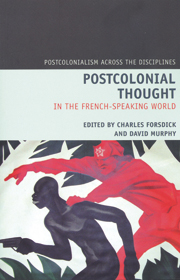Book contents
- Frontmatter
- Contents
- Acknowledgements
- Introduction: Situating Francophone Postcolonial Thought
- Section 1 Twelve Key Thinkers
- 1 Aimé Césaire and Francophone Postcolonial Thought
- 2 Maryse Condé: Post-Postcolonial?
- 3 Jacques Derrida: Colonialism, Philosophy and Autobiography
- 4 Assia Djebar: ‘Fiction as a way of “thinking”’
- 5 Frantz Fanon: Colonialism and Violence
- 6 Édouard Glissant: Dealing in Globality
- 7 Tangled History and Photographic (In)Visibility: Ho Chi Minh on the Edge of French Political Culture
- 8 Translating Plurality: Abdelkébir Khatibi and Postcolonial Writing in French from the Maghreb
- 9 Albert Memmi: The Conflict of Legacies
- 10 V. Y. Mudimbe's ‘Long Nineteenth Century’
- 11 Roads to Freedom: Jean-Paul Sartre and Anti-colonialism
- 12 Léopold Sédar Senghor: Race, Language, Empire
- Section 2 Themes, Approaches, Theories
- Notes on Contributors
- Bibliography
- Index
2 - Maryse Condé: Post-Postcolonial?
from Section 1 - Twelve Key Thinkers
- Frontmatter
- Contents
- Acknowledgements
- Introduction: Situating Francophone Postcolonial Thought
- Section 1 Twelve Key Thinkers
- 1 Aimé Césaire and Francophone Postcolonial Thought
- 2 Maryse Condé: Post-Postcolonial?
- 3 Jacques Derrida: Colonialism, Philosophy and Autobiography
- 4 Assia Djebar: ‘Fiction as a way of “thinking”’
- 5 Frantz Fanon: Colonialism and Violence
- 6 Édouard Glissant: Dealing in Globality
- 7 Tangled History and Photographic (In)Visibility: Ho Chi Minh on the Edge of French Political Culture
- 8 Translating Plurality: Abdelkébir Khatibi and Postcolonial Writing in French from the Maghreb
- 9 Albert Memmi: The Conflict of Legacies
- 10 V. Y. Mudimbe's ‘Long Nineteenth Century’
- 11 Roads to Freedom: Jean-Paul Sartre and Anti-colonialism
- 12 Léopold Sédar Senghor: Race, Language, Empire
- Section 2 Themes, Approaches, Theories
- Notes on Contributors
- Bibliography
- Index
Summary
How does one introduce Maryse Condé to the uninitiated reader? Condé's centrality to Francophone studies and her popularity outside academic circles make this question more than merely rhetorical. Indeed, her fame has spread beyond the academic circle of scholars and students in Francophone studies – far beyond, in fact. English, German, Dutch, Italian, Japanese, Portuguese and Spanish translations of her work testify to her growing global audience. Her oeuvre has earned her a number of accolades that reflect her widespread appeal: the French government named her Commandeur de l'Ordre des Arts et des Lettres in 2001 and Chevalier de la Légion d'Honneur in 2004; the Québec government made her an honorary member of the Académie des Lettres du Québec in 1998; and Guadeloupeans acknowledged her importance in a four-day conference on her work in Pointe-à-Pitre in March 1995. In spite of her widespread popularity, however, her creative work has been analysed in a largely fragmented fashion, and her critical work is little known within postcolonial studies in the English-speaking world.
Maryse Condé, née Boucolon, was born in Guadeloupe in 1937, before the island's status changed (nominally) from that of colony to that of Département d'Outre Mer in 1946. She grew up in Guadeloupe until her parents sent her to pursue her studies in France at the age of 16. After receiving her BA in English and Classical Literatures from the Sorbonne in Paris, she married African actor Mamadou Condé in 1959.
- Type
- Chapter
- Information
- Postcolonial Thought in the French Speaking World , pp. 42 - 52Publisher: Liverpool University PressPrint publication year: 2009



